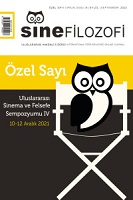Sinemanın “Yedinci Sanat” Olma Niteliği: Ricciotto Canudo’nun Schopenhauer ve Hegel Felsefelerinden İlham Aldığı Bütüncül Sanat Görüşü Üzerine Bir İnceleme
The Quality of Cinema as the “seventh art”: A Study on Ricciotto Canudo’s New Total View of Art Inspired by the Philosophies of Schopenhauer and Hegel
Author(s): Tunç YıldırımSubject(s): Aesthetics, German Idealism, Sociology of the arts, business, education, Film / Cinema / Cinematography, History of Art
Published by: Serdar Öztürk
Keywords: Canudo; theory of seven arts; silent cinema aesthetics; Schopenhauer; Hegel; Wagner; Romanticism;
Summary/Abstract: Ricciotto Canudo is a journalist, literary critic, musicologist, novelist and screenwriter who began writing film reviews as early as 1907. He is also an Italian-origin avant-garde art-loving intellectual who settled in Paris, the cradle of modern art, in the early 1900s. Canudo is considered an outstanding cinematic aesthetician who had given cinema the honor of the “seventh art”. In the original thought of this essayist, cinema, as an art form, is added to the six traditional arts (architecture, music, painting, sculpture, poetry and dance) because this new expression is the fusion of plastic arts, rhythmic arts, science and art at the same time. By founding the pioneering cinema club Club des Amis du Septième Art (Club of Friends of the Seventh Art) in Paris, Canudo, as a propagandist of cinema, embarked on the missionary of cinema, which he accepted as a new art. Canudo’s name is also known as a great cinema thinker, even an elite theorist, who wrote radical manifestos (La naissance d’un sixième Art: Essai sur le cinématographe, Manifeste des sept arts) for his cause, published a specialist magazine (La Gazette des Sept Arts) for this cause, and attempted to explain cinema aesthetics with some important essays (L’esthétique du Septième art). Well, what roles do the philosophies of Arthur Schopenhauer and Georg Wilhelm Friedrich Hegel play in the formation of the idea of “seventh art”, which took place in the conception of this Latin nationalist art lover, who passionately defends the specific aesthetics of cinema and glorifies this new expression as pure art? What is the influential place of these philosophical figures in Canudo’s cultural background or cultural baggage? Why is cinema or, in Ricciotto Canudo’s specific words, “cinegraphy” the indispensable seventh or even total (holistic) art of modern times? In this study; the seventh art discourse of Canudo, who is at the same time a cinema esthetician, theorist, essayist and critic, and his philosophical thought about the new art of cinema will be analyzed in the context of his close relations with the art philosophies of two German philosophers such as Schopenhauer and Hegel. In order to do this, it will be acted within the framework of a historical and comparative reading method.
Journal: SineFilozofi
- Issue Year: 7/2022
- Issue No: Sp. Iss.
- Page Range: 55-72
- Page Count: 18
- Language: Turkish

